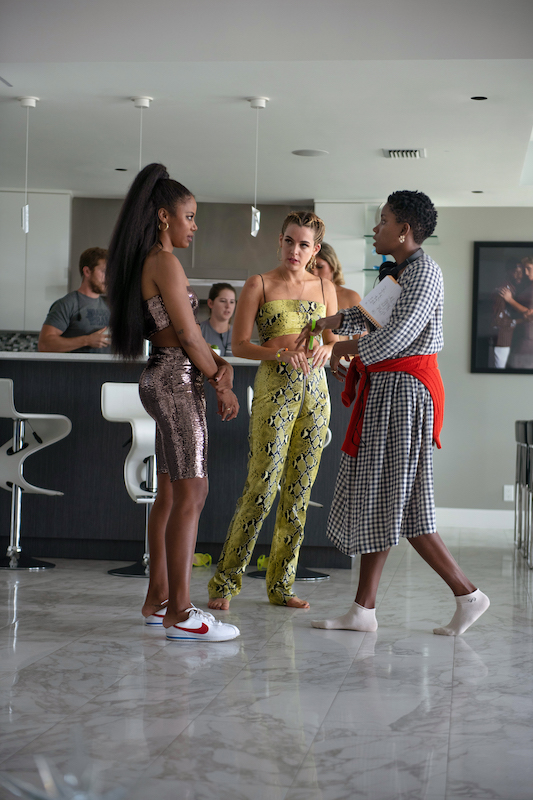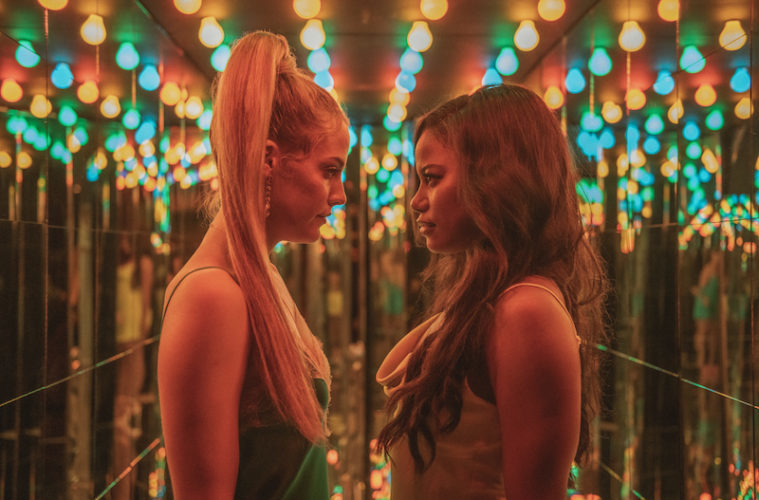“Have you taken a shower since the trip?” actress Taylour Paige asks at the start of our Zoom interview about Zola, the new A24 film in which she plays the title character and narrator. We’d just screened the movie before the interview and co-star Riley Keough, also on the video call, agrees that post-viewing might require some serious refreshing. Ultimately, we all agree a quick “hoe bath” (the affectionate(?) term for sink washing of sweaty areas, fittingly, originating in sex work) should be in order after watching this endearing yet revolting little movie with big chops. It’s a weird and probably inappropriate way to start an interview, but this is a weird film, and the raunchy repartee feels right.
We weren’t quite sure what Zola’s intentions were after seeing it, so it was helpful to talk to its stars about it. We do know it made us feel uncomfortable and that was probably intentional. We were also very aware of the Twitter posts by the real “Zola” (a.k.a. Aziah Wells) back in 2015. In fact, we were one of the platform’s many users who followed it in real-time as it unfolded into an epic 148 tweet storm that caught the attention of, well, everybody. Was “The Story,” as it’s called, made up? Exaggerated? It really didn’t matter because either way, Wells showed her gift for riveting, unfiltered story-telling infused with humor, sass and streetsmart critique. The viral moment suggested that a book deal and maybe even a movie could be in the works based on the Detroit-based dancer’s enticing social media narrative.
And now we have it. Directed with naughty nuances and trenchant finesse by Janicza Bravo (who also wrote the script with playwright Jeremy O. Harrison, based on a Rolling Stone article about the tweets) the movie tells the tempestuous tale of two strippers – Zola and Stefani – who go on a club tour to Florida to earn some extra cash and end up getting wrapped up and wrangled into prostitution and unsavory hijinx involving violent thugs, crazy boyfriends and merciless pimps. Before the journey ends, money is earned, but blood is also spilled, and nobody (except maybe the johns) seems satisfied. The film is fun to look at, as are all the actors involved, but the tone is hard to pinpoint. Is there a takeaway here or is it just another debauchery-driven fantasy about “money and titties,” eclipsing substance or message?
Paige says Zola is far from mindless depravity. “Black women go through the world often with a lot of baggage. They’re expected to nurture and take care of and not be cared for. A lot of times they’re expected to be strong and to handle it and carry these fucking bags and no one ever asks how heavy they are, who put them there, what’s in the bags, or how they got there in the first place,” she says. “It’s racial commentary, it’s this country, it’s women, it’s sex work… the bigger picture is the human condition and what we’re all doing to figure out this life. But also it is entertaining, it’s funny and it’s about a Black woman who processed her trauma, tweeted about it, and now we’re here.”
“Here” is a lot more complex in 2021. With racial reckoning, cultural appropriation and #Metoo conversations on one end, and sexual empowerment, wokeness and cancel culture on the other, we’re all fed daily doses of division on social media, more than we could’ve ever possibly imagined. What read as provocative and real in tweets feels decidedly more intense on screen, especially now. Bravo smartly aims to balance the darkness with light touches like twinkle sound effects and artsy edits, and it works not only cinematically, but in conveying how our internet selves – thirsty selfies, humble brags, call-outs and all – have come to define how we see ourselves and our interactions in real life. Zola (which has an “@” tag in its title for promo) sucks you in, kinda the same way the comments section can do so on socials. At times you feel icky about being entertained by the shamelessness and more so, the ugliness; and you probably should.

Riley Keough and Taylour Paige (right) in ZOLA (A24 Films)
Keough pulls off the challenging feat of being “as offensive as possible” and still having sympathetic moments. Stefani’s vulgar use of “A.A.V.E.” (African American Vernacular English) is actually pretty mesmerizing in the beginning, especially as she charms Zola into a friendship. Eventually, her words and “blaccent” cross the line as does the trip itself, and Zola – whose thoughts we get to hear throughout the experience – must find the strength just to survive. “This bitch” Zola will eventually “fall out” with, is as clueless as she is classless.
“It’s very intentional,” says Keough, who really is the polar opposite of Stefani, soft-spoken and thoughtful in tone. “Janicza is a genius. Down to every choice – every scene, every hairstyle and outfit. Of course there are going to be people who don’t like it. This girl is a demonic villain. But it’s all serving a purpose. There might be some people that miss that. That’s OK. But it is racial commentary and there are serious subjects being tackled within this wild adventure.”
The female perspective is strong here, even as many scenes are sure to titillate. Both ladies’ stripper moves and pole skills are on point, and Paige tells us she did practice sessions at L.A.’s own Crazy Girls to prep for the role. Bravo’s shooting style conveys both a buddy flick bond and sexual tension between the leads in the beginning, but soon enough everything turns upside down. Disdain, division and danger emerge, and the two women’s stories ultimately diverge drastically. When Stefani shares her side of the story late in the film, we finally see that she’s not the victim she pretends to be, she’s a fake who knew exactly what she was getting her new “sis” into, and she has no qualms about playing up her whiteness when she needs to.

Taylour Paige, Riley Keough and director Janicza Bravo on the set of ZOLA. (Anna Kooris / A24 Films)
“In anybody else’s hands I wouldn’t have done this,” Keough says of Stefani’s problematic nature and the decision to tackle it with Bravo. “There could have been other versions of this that would’ve been extremely reckless and horrible. And just pointless. I trusted Janicza so much I didn’t actually have reservations about doing this. I want to make art that makes people think and talk about things. It’s one of my favorite things about making films. You get this opportunity to explore very serious ideas under the guise of comedy or a wild ride or a scare.”
Keough’s first big-screen role was as Cherie Currie’s sister in The Runaways, which she followed up with a slew of horror and indie flicks – Under the Silver Lake with Andrew Garfield was a standout. The actress, who was born in Santa Monica, definitely made a name for herself beyond her famous family (her mom is Lisa Marie Presley) and embodying this controversial character as she does so well, should take her career to new heights. Paige is just as captivating, conveying more with her eyes than her narration ever does. She grew up in Inglewood, Calif., has had roles in a few films, as well as a starring role on VH1’s Hit The Floor. Most recently she played Viola Davis’ girlfriend turned Chadwick Boseman’s lover in Ma Rainey’s Black Bottom.
Colman Domingo as “X” the pimp merits mention too, for capturing the mysterious and menacing presence of the volatile villain in Wells’ original Twitter tale. He shines here, much like he did in Euphoria, especially the one-on-one episode opposite Zendaya last year. We envisioned Stefani’s boyfriend a bit more psychotic from Zola’s tweets, but Nicholas Braun as Derek fits in well with the ensemble regardless. And yes, comparing movie portrayals of people from tweets versus books is a strange thing to do, but it’s a reflection of the digital age, and we wouldn’t be surprised to see more films based on viral internet shares in the future, especially since this one turned out so well, even with the tricky subject matter.

Taylour Paige in ZOLA (A24 Films)
Zola had the unfortunate luck of gaining steam just before the pandemic. It debuted at Sundance 2020 and was a Grand Jury Prize nominee just a month before COVID-19 changed the world and delayed movie releases. But the buzz has been ablare since it went into production, and especially after the official trailer for the theatrical release came out this year. Yes, it trended on Twitter.
“Zola knew she had some gold and she could write it in a way that was interesting because she’s dope,” Paige – who got to know Wells via phone conversations – says during the last few minutes of the Zoom chat. “Contrast creates clarity and more than one thing can be true here. Life can be complicated. The power of the mind, the power of your power, the power of knowing your worth, it’s all in there.”
The fact that this movie was made at all is pretty remarkable. Zola provides a point of view we don’t often see on film and aside from the sex and violence, “the story” of “the trip” is as enlightening as it is entertaining, thanks to both leads’ thoughtful approach as well as the film’s Black female writer/director interpreting the experiences of another whose truth was as intriguing as it was disturbing. Skewering the inequities of life – whether crassly on social media or contextually on film – can clearly be a part of the journey to self-expression and empowerment either way. Even if you feel dirty afterward, it’s probably worth it.
Advertising disclosure: We may receive compensation for some of the links in our stories. Thank you for supporting Irvine Weekly and our advertisers.

